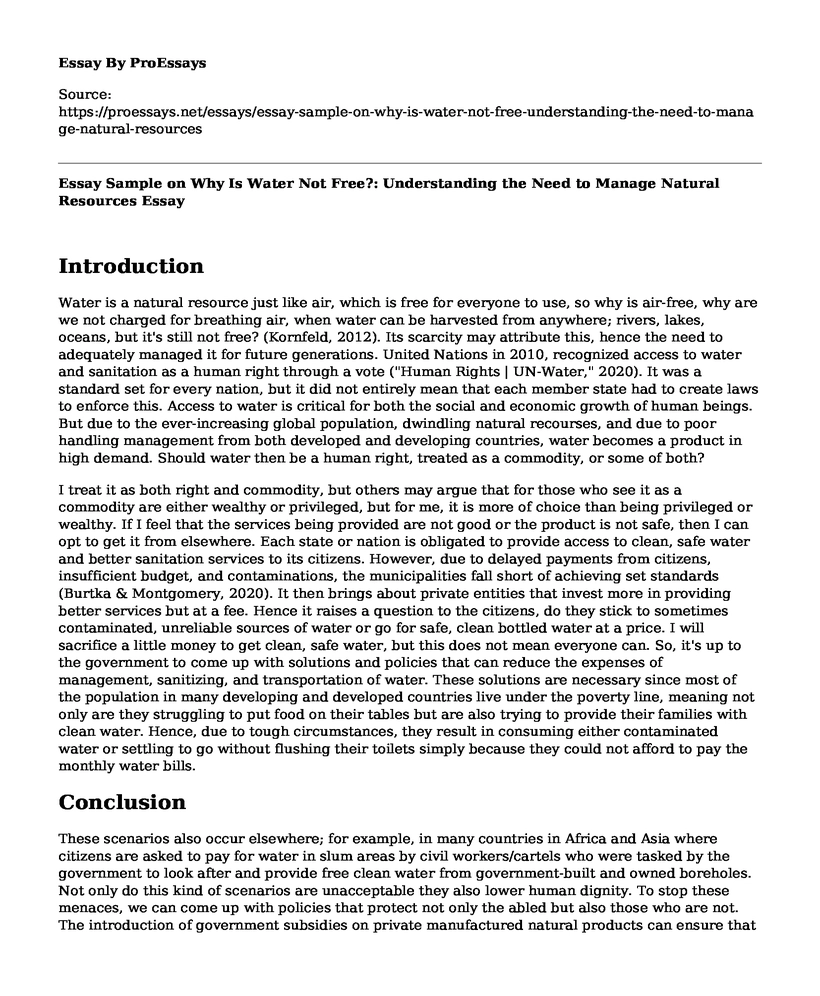Introduction
Water is a natural resource just like air, which is free for everyone to use, so why is air-free, why are we not charged for breathing air, when water can be harvested from anywhere; rivers, lakes, oceans, but it's still not free? (Kornfeld, 2012). Its scarcity may attribute this, hence the need to adequately managed it for future generations. United Nations in 2010, recognized access to water and sanitation as a human right through a vote ("Human Rights | UN-Water," 2020). It was a standard set for every nation, but it did not entirely mean that each member state had to create laws to enforce this. Access to water is critical for both the social and economic growth of human beings. But due to the ever-increasing global population, dwindling natural recourses, and due to poor handling management from both developed and developing countries, water becomes a product in high demand. Should water then be a human right, treated as a commodity, or some of both?
I treat it as both right and commodity, but others may argue that for those who see it as a commodity are either wealthy or privileged, but for me, it is more of choice than being privileged or wealthy. If I feel that the services being provided are not good or the product is not safe, then I can opt to get it from elsewhere. Each state or nation is obligated to provide access to clean, safe water and better sanitation services to its citizens. However, due to delayed payments from citizens, insufficient budget, and contaminations, the municipalities fall short of achieving set standards (Burtka & Montgomery, 2020). It then brings about private entities that invest more in providing better services but at a fee. Hence it raises a question to the citizens, do they stick to sometimes contaminated, unreliable sources of water or go for safe, clean bottled water at a price. I will sacrifice a little money to get clean, safe water, but this does not mean everyone can. So, it's up to the government to come up with solutions and policies that can reduce the expenses of management, sanitizing, and transportation of water. These solutions are necessary since most of the population in many developing and developed countries live under the poverty line, meaning not only are they struggling to put food on their tables but are also trying to provide their families with clean water. Hence, due to tough circumstances, they result in consuming either contaminated water or settling to go without flushing their toilets simply because they could not afford to pay the monthly water bills.
Conclusion
These scenarios also occur elsewhere; for example, in many countries in Africa and Asia where citizens are asked to pay for water in slum areas by civil workers/cartels who were tasked by the government to look after and provide free clean water from government-built and owned boreholes. Not only do this kind of scenarios are unacceptable they also lower human dignity. To stop these menaces, we can come up with policies that protect not only the abled but also those who are not. The introduction of government subsidies on private manufactured natural products can ensure that everyone can afford clean, safe water but still have a right to choose where they can get it either from public or private companies.
References
Itzchak E. Kornfeld. (2012). Water: A Public Good or a Commodity? Proceedings of the Annual Meeting (American Society of International Law), 106, 49-52. doi:10.5305/procannmeetasil.106.0049
Human Rights | UN-Water. (2020). Retrieved 19 March 2020, from https://www.unwater.org/water-facts/human-rights/
Burtka, A., & Montgomery, W. (2020). A right to water - Is water a human right or a commodity? Retrieved 19 March 2020, from https://erb.umich.edu/2018/05/30/a-right-to-water/
Cite this page
Essay Sample on Why Is Water Not Free?: Understanding the Need to Manage Natural Resources. (2023, Apr 24). Retrieved from https://proessays.net/essays/essay-sample-on-why-is-water-not-free-understanding-the-need-to-manage-natural-resources
If you are the original author of this essay and no longer wish to have it published on the ProEssays website, please click below to request its removal:
- The Process of Blood Flow and Sporting Events
- Animal Bush Meat and Ethics Essay Example
- Essay Sample on Metabolism and Urinary System
- Essay Example on Explore Animal Diversity in Tanzania & Costa Rica: Bird Watching Hotspots
- Utilitarianism on Animal Rights - Essay Sample
- Essay Example on Altering Genomes: A Practice Since Generations
- Essay Example on Trees Talking: Unravelling the Symbiotic Networks of Nature with Suzanne Simard







